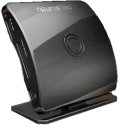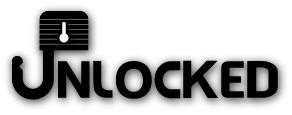Vendor of Linux-based DVR “unlocks” DRM
Dec 28, 2007 — by Eric Brown — from the LinuxDevices Archive — 1 views Does Microsoft's “PlaysForSure” motto really mean it plays for sure? Does Apple's “FairPlay” play fair? Not exactly, says Linux-based media device vendor, Neuros, which is promoting an “Unlocked” media trademark in response to branded, proprietary digital rights management (DRM)… schemes.
Does Microsoft's “PlaysForSure” motto really mean it plays for sure? Does Apple's “FairPlay” play fair? Not exactly, says Linux-based media device vendor, Neuros, which is promoting an “Unlocked” media trademark in response to branded, proprietary digital rights management (DRM)… schemes.
With its “Unlocked” campaign, Neuros is hoping to encourage the use of open-standard “DRM-Free” files that can be stored and played anywhere, while at the same time promoting a new logo (see below) for use by DRM-free products. Neuros sells the Neuros OSD (“open source device”), an open source Linux-based digital video recorder (DVR) appliance. The OSD (shown at left) can record MPEG-4 video from analog sources, such as cable TV and DVD players, and transfer it to memory cards, Apple's video iPod, portable media players (PMPs) such as Neuros's 442 device, or other Linux-based A/V devices, according to the company.

Unlocked logo
The “Unlocked” campaign is both a tongue-and-cheek jab at the frustrations of dealing with the limits of Microsoft's and Apple's DRM schemes, as well as a serious call for freeing up DRM-related media constraints. In a blog on the Neuros site, Founder Joe Born writes, “The hope is that consumers come to associate the 'unlocked' mark with compatibility and versatility, and to make a distinction that will shame all the DRM vendors (although they are obviously not easily shamed).”
The blog also presents some amusing videos. In one (seen below), Born says, “Microsoft's 'PlaysForSure' quit playing the minute the Zune came out. Apple's 'FairPlay' only plays fair with the 'i' stuff. What's next, guys?”
Neuros founder Joe Born touts “Unlocked” in this tongue-in-cheek video
(Click to play)
The campaign is not the first time the company has evangelized for open source technology and the free flow of information while also drawing attention to its products. Just last month it co-hosted a contest with a TiVo consulting firm, DRVupgrade, offering to pay $3,500 for hacks that enabled Neuros's OSD to track TiVo selections, recording the same content for playback on mobile devices.
It may be clever marketing, yet Neuros's open source involvement runs deep. In his blog, Born says he is trying to encourage nonprofit groups such as the Electronic Frontier Foundation or the Free Software Foundation to take over the campaign and organize the rules for use of the “trademark.” Neuros has long been active with these and other groups on DRM-related issues. In an email, he wrote, “We hope to create a grass roots movement in support of unlocked files and put consumers back in control of their media.”
Indeed, consumer resistance to DRM-burdened media seems to be growing, at least according to Amazon, which yesterday added content from the Warner Music Group to its online store. Launched in September, the store already featured content from Universal and EMI, and now sells more than 2.9 million DRM-free songs, the company says.
Further Information
The Neuros OSD comes with an open source Linux application environment and a free-use DSP toolchain. The company encourages creative hacks for its products by publishing specifications and software development kits, and maintaining development communities. Meanwhile, both the OSD and the 442 PMP have benefited from improvements suggested by the open source community.
Born's blog and videos are available here.
This article was originally published on LinuxDevices.com and has been donated to the open source community by QuinStreet Inc. Please visit LinuxToday.com for up-to-date news and articles about Linux and open source.